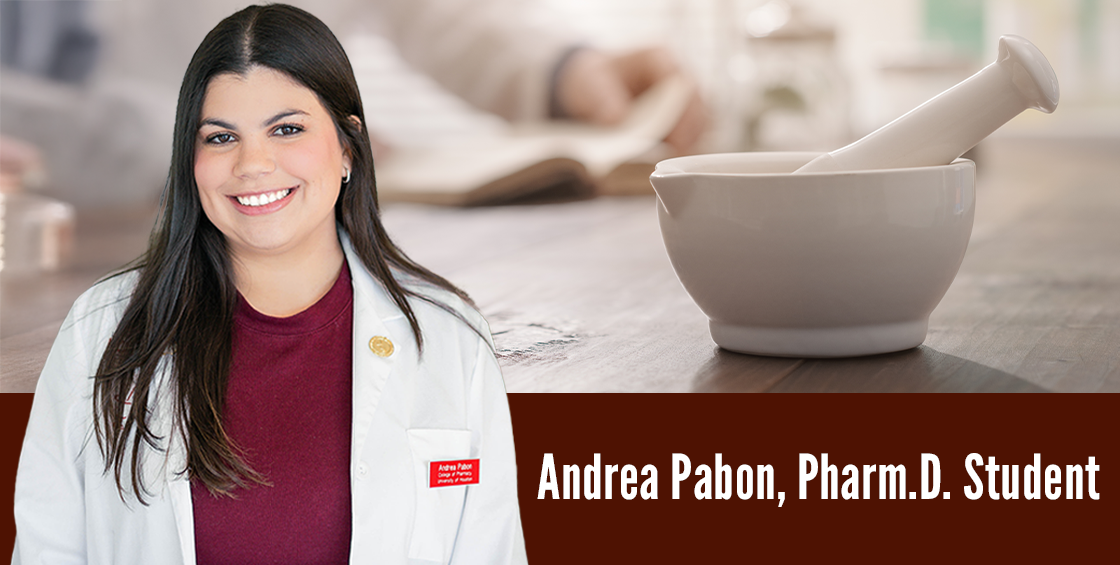When Andrea Pabon left Puerto Rico at 17, she never imagined how far her journey would take her—or the lives she would touch along the way. Now a third-year Pharm.D. student at the University of Houston College of Pharmacy (UHCOP), Pabon has embraced her role in advancing community health, gaining hands-on experience and addressing health care disparities with compassion and purpose.
Connecting with Communities in South Texas
Pabon said her most transformative experience took place in the Rio Grande Valley, where she and fellow UHCOP students volunteered at the DHR Health Community Health Fair. Recently brought back after a pause during the pandemic, the annual event aimed to address chronic disease prevention in a region where diabetes is the third leading cause of death.
"Hispanics prefer the natural route, like home remedies that have been passed down generation to generation," Pabon said. "We understand why they want to go the natural route, but we also want to educate them while validating their feelings."
The goal was to encourage sustainable lifestyle changes alongside medication use.
"We emphasized medication is not the solution for everything," Pabon said. "It's also incorporating a heart-healthy diet, lowering processed sugars and trans fats, and a little bit of exercise goes a long way."
The trip wasn't just about patient education—it was a large-scale, meaningful student-led effort that reflected the group's commitment.
"We coordinated the weekend, carpooled down there, and once we got there, we were welcomed with open arms," Pabon said. "A huge shout-out goes to the P1s because they had an exam the following Monday and still went."
A New Perspective on Communication
One experience during the trip opened her eyes in an unexpected way. Pabon recalled meeting a patient and their partner who were both deaf and communicated through sign language. Although she wasn't fluent, she tried to connect in a small but sincere way.
"All I knew how to sign was 'Thank you' and when they saw me do that, they were so happy," Pabon said. "It made me realize how much more I want to learn, especially in our ever-changing world."
Mentorship and a First Publication
Pabon's strong commitment to community care also opened the door to academic research, an experience that resulted in her first publication. Despite not having any classes with her, Pabon found a connection with UH faculty member Natalie Rosario, Pharm.D., MPH, BCACP, through their shared Puerto Rican heritage, which sparked her interest in working alongside her at Vecino's Denver Harbor Family Health Center.
Pabon was welcomed into Rosario's research team, joining four other students on a project that involved reviewing patient charts to track trends in diabetes management. The team focused on how patients' treatment regimen shifted from short- to long-acting insulin, examining the impact on blood sugar levels and A1C results (a key test in diagnosing diabetes).
"For these patients, we observed that the longer-acting insulin was improving their insulin levels," Pabon said. "Longer-acting insulin works steadily over time, so patients only need to inject themselves once a day, compared to injecting three times a day with short-acting insulin."
From Internship to Impact
At Legacy Community Health, Pabon discovered not just new skills, but a new direction. She began interning at the facility the summer after her P1 year, and it quickly became a place of learning, inspiration, and a glimpse into life as an ambulatory care pharmacist.
Serving diverse and often underserved patient populations—including those living with human immunodeficiency virus (HIV) and acquired immunodeficiency syndrome (AIDS), the uninsured, people experiencing homelessness, and members of the LGBTQ and Hispanic communities—Pabon gained valuable insight into the role pharmacists can play in long-term patient care. This included learning about pre-exposure prophylaxis (PrEP) and post-exposure prophylaxis (PEP) medication that helps prevent HIV infection when taken either before or immediately after possible exposure.
"I learned so much about what it's like living with HIV, how to care for patients with PrEP and PEP, and how to communicate with patients in a way that respects their privacy and lived experience," Pabon said.
Pabon hadn't originally planned to pursue a residency, but her time at Legacy changed that. Encouraged to prepare early by Legacy's director of pharmacy operations, she has since embraced the idea.
"He told me, 'Even if you don't end up doing residency, start preparing as if you're going to because you'd rather be prepared and not do it than not prepared and wanting to do it later,'" Pabon said. "I'm a person who likes school. So, doing two more years to be specialized in something I really love is a no-brainer for me."
Pabon says she is currently drawn to ambulatory care, but she's hoping her fourth year rotations will give her more clarity about the right path.
Support from Home and Heart
Behind Pabon's drive is a strong support system, particularly her fiancé, whom she credits with helping her manage the day-to-day realities of pharmacy school.
"He's my cook, my cleaner, my dog walker, my laundry folder," Pabon said. "There were nights in spring semester when I would come home every day at 10 p.m. and shower, go to bed, wake up early, and repeat. I wouldn't be here if it weren't for him."
Her parents have also been a key part of her journey, offering unwavering encouragement from afar.
"My father is in Puerto Rico and my mom lives in Florida, and then I'm here in Houston," Pabon said. "My parents have always inspired me to go above and beyond and never doubted me. Every time I go home, they're so proud of me."
